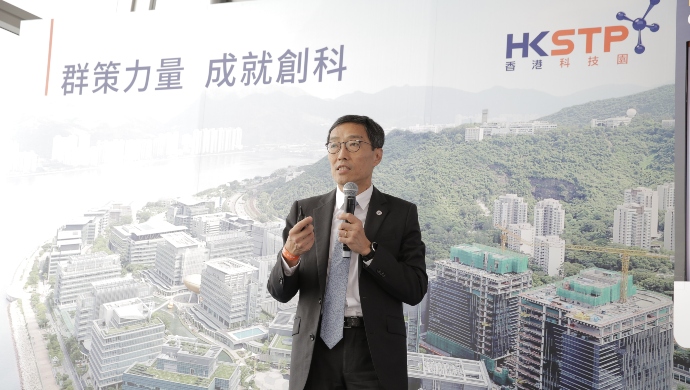Here is how Hong Kong Science and Technology Parks Corporation plans on building the city’s ecosystem

Hong Kong Science and Technology Park CEO Albert Wong
In the Pearl of the Orient, 2018 will be remembered as a defining for the year Hong Kong Science and Technology Parks Corporation (HKSTP).
In March, HKSTP stepped into the policy spotlight when it received a massive HK$40 billion (US$5.1 billion) injection from the government budget.
HK$10 billion (US$1.3 billion) of that money was reserved for supporting tenants and facilitating the overall success of the science park.
Today, HKSTP announced exactly what it intends to do with the money, and startups are set to receive significant benefits.
“The time is now for us to capture the global opportunities and make Hong Kong truly competitive on the I&T landscape,” said Albert Wong, the CEO of HKSTP at a press event.
“We must leverage the core strengths and strong fundamentals that Hong Kong enjoys as an I&T hub, to build the critical mass that can eventually attract more technology companies, talent and investment to our shores,” he said.
Wong also said what the budget allocation shows: The Hong Kong government is taking technology seriously as a core driver of public policy.
The announcement was broken into three core tracts. Let’s have a look at them.
Early-stage startups
One new initiative announced today was the Science and Technology Entrepreneur Programme (STEP), which will provide up to HK$100,000 (US$12,800) for young startups and individuals.
It is a fairly open application process whereby anyone can apply online. Applications will be judged based on the business proposal, the team and the technology.
“We recognise that there are individuals out there with great ideas with great ideas for a new or disruptive technology. Often, the challenge is that they don’t know where to go for advice or how to turn their ideas into a product. This programme will assist them in crystallisng their ideas or business plans and make the right connections within our ecosystem,” said Wong.
Also Read: How Techstars is positioning itself as a trailblazer with these 10 startups
Furthermore, its current incubation programmes will be getting a boost. Incu-App (a two year programme ) and Incu-Tech (a three year programme), will be receiving an injection of HK$320,000 (US$41,000) and HK$480,000 (US$61,000) per startup.
A four-year incubator called Incu-Bio will inject HK$4 million (US$510,000) and the Leading Enterprise Acceleration Programme will support startups with HK$1.2 million (US$153,000).
The Corporate Venture Fund
The first initiatives are clearly targetted at young Founders and budding startups. If any of them ‘hit’, this is where the Corporate Venture Fund steps in.
Today’s announcement expanded the money in purse to HK$200 million (US$25.5 million). and its co-investment initiative means startups typically raise quite a bit more than the original HKSTP investment.
The fund has a one-for-one matching requirement with the public sector but Raymond Wong, the HKSTP Head of Investment, told e27 also said that for every dollar put in by the investment arm, they are seeing 13 dollars from the private market.
The fund focusses on Seed and Series A investment, which is a funding gap in Hong Kong. The maximum that the fund can invest in each company is US$1 million.
“We think the government funding is acting as a catalyst, meaning [the government] wants to share the risk, find a promising company and share it with private investors. Recently, we have seen more and more interest from private investors who want to diversify…there is a lot of interest,” he said.
Also Read: How a lazy student who caught and sold spiders transformed himself into a successful founder
Wong said the private market for technology in Hong Kong is diversifying. Yes, the city has angels, VCs and corporate venture funds but the financial hub is also seeing involvement from family offices and private equity firms who are looking at younger companies as part of their long-term strategy.
Over two years, the Corporate Venture Fund has invested in about ten companies.
Attracting foreign talent
A universal truth of every tech hub across the world is that the success of the ecosystem coincides policies that attract foreign talent.
HKSTP is not simply setting up friendly policies for foreigners, the agency is actively wooing international R&D companies. The science park hopes to nearly double the number of tenants — from 270 to 500 — over the next five years.
The HKSTP will subsidise tenants with a 3-month rent waiver to get them going, with the hope that that extra capital can be re-invested into the company.
The Corporate Venture Fund has launched an an Accommodation Support Scheme, , which is meant to subsidise costs in Hong Kong to attract foreign talent. If the person is involved in R&D, they can visit Hong Kong for 6-12 months and expect a HK$10,000 (US$1250) monthly rent stipend for nearby neighbourhoods.
In an effort to get companies used to Hong Kong, HKSTP will add at a one-month international programme under the Global Acceleration Academy which will invite foreign startups to partake in Hong Kong’s tech ecosystem.
A final point on the future HKSTP is the park will actively cooperate with Shenzhen — the Chinese mega-city right across the border that has grown into a global tech hub.
Wong said it is important for Hong Kong, a relatively small market by itself, to work with cities like Shenzhen and pointed out that “collaboration and competition go hand-in-hand”.
Whether it is official studies, or simply talking to people on the ground, people think Hong Kong should be further along the tech-industry road. If yesterday’s announcement is any indication, policymakers have recognised the issue and have thrown their support behind the tech ecosystem.
In Hong Kong, the time is now for agencies like HKSTP to drive the IT industry forward.
—
The post Hong Kong science and tech hub set to deploy US$1.3B focussed on startups appeared first on e27.
Source: E27

